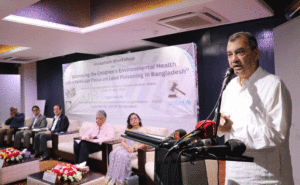UN meeting gives countries the right to refuse unrecyclable, polluting plastics
MAY 10, 2019
Geneva, Switzerland —Today, 187 countries took a major step forward in curbing the plastic waste crisis by adding plastic to the Basel Convention, a treaty that controls the movement of hazardous waste from one country to another. The amendments require exporters to obtain the consent of receiving countries before shipping most contaminated, mixed, or unrecyclable plastic waste, providing an important tool for countries in the Global South to stop the dumping of unwanted plastic waste into their country.
After China banned imports of most plastic waste in 2018, developing countries, particularly in Southeast Asia, have received a huge influx of contaminated and mixed plastic wastes that are difficult or even impossible to recycle. Norway’s proposed amendment to the Basel Convention provides countries the right to refuse unwanted or unmanageable plastic waste.
Norway proposed the new restrictions and received overwhelming support at the meeting. Opponents of the decision included Argentina, Brazil, US, and the chemicals and plastics industries. Aggressive industry and US lobbying at a previous UN meeting temporarily slowed progress on the plastics waste issue, but at this meeting, governments took a dramatic step forward. The decision occurred against a backdrop of a UNEP report on combatting marine litter and microplastics and consensus resolutions on this topic at the 3rd and 4th meetings of the UN Environment Assembly.
Earlier on 4 May, Environment and Social Development Organization-ESDO Executive Director, MS. Siddika Sultana in her intervention in the BRS COP plenary session said “Plastic is literally choking our oceans. Everywhere we look we see the carnage — dead cows, whales washing up with stomachs full of plastic, seabirds suffocating, turtles drowning in plastic nets. And most of the plastic enters the sea in developing countries without strong recycling systems.”
She also added that “why it’s so INSANE that rich countries are shipping their plastic waste to some of these exact countries! Now we have a chance to change it. A coalition of countries led by Norway is pushing to add plastic to a deal on hazardous waste, meaning it couldn’t be exported unless there were safeguards it would be properly processed, and giving developing countries the right to refuse it. We can’t solve the plastic crisis engulfing our oceans while using pristine coastlines as a global plastic dump. So we urge the parties to come forward take a decision.”
Moreover, ESDO started a war against plastic in 1990, and the initial focus was banning the Plastic Shopping Bag, after 13 years of struggle ESDO win in Bangladesh, and became the 1st country to Ban Plastic Bag in 2002. Now together with numerous countries and billions of voice to “Beat the Plastic Pollution”.
The new UN decision will have the greatest impact on the US because the treaty prohibits the export of listed wastes from countries that have not ratified the Convention (such as the US). In 2018, the United States exported 157,000 large shipping containers of mixed plastic wastes to developing countries already overwhelmed with plastic pollution. The new UN decision will force the US to deal with its own plastic waste into the future.
Governments noted that plastic can contain hazardous substances and that plastic pollution is, “a serious environmental problem on a global scale.” Previous studies of consumer products demonstrate that hazardous substances in plastics are carried into new products when recycled.
Countries acknowledged the rapidly increasing levels of marine plastic litter and microplastics and the serious impacts it is having on marine biodiversity, ecosystems, fisheries, tourism, and local communities. At the meeting, a Stockholm Convention regional center documented concerns over hazardous chemicals present in plastics.
The unanimously adopted actions on plastic wastes include:
- Removing or reducing the use of hazardous chemicals in plastics production and at any subsequent stage of their life cycle.
- Setting of specific collection targets and obligations for plastics producers to cover the costs of waste management and clean-up.
- Preventing and minimizing the generation of plastic waste, including through increasing the durability, reusability and recyclability of plastic products.
- Significant reduction of single-use plastic products.
Unfortunately, a group of cured resins and fluorinated polymers was not included in the requirement of prior informed consent, which means they can be freely traded without notification. Some of these resins and polymers release toxic chemicals during breakdown, including fluoropolymers that can breakdown to hazardous fluorinated chemicals. However, delegates agreed to review these allowances at their next meeting in 2021.
“This historic decision stops plastic trash dumping at the borders of exporting countries,” said Dr. Mariann Lloyd-Smith, IPEN Senior Advisor.
Mr. Von Hernandez, Global Coordinator, Break Free from Plastic said, “This is a crucial first step towards stopping the use of developing countries as a dumping ground for the world’s plastic waste, especially those coming from rich nations. Countries at the receiving end of mixed and unsorted plastic waste from foreign sources now have the right to refuse these problematic shipments, in turn compelling source countries to ensure exports of clean, recyclable plastics only.


